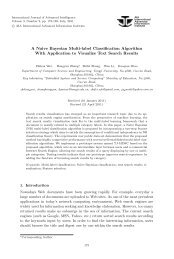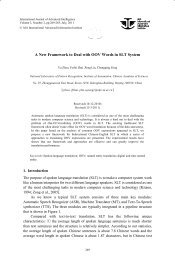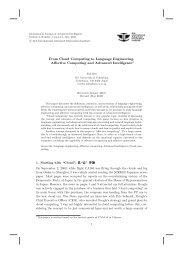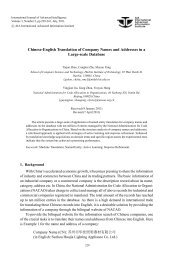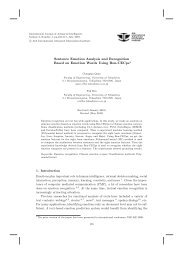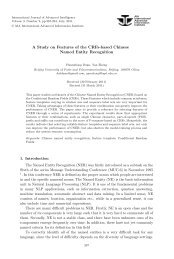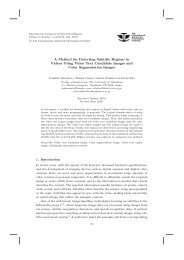IEEE NLP-KE 2011
IEEE NLP-KE 2011
IEEE NLP-KE 2011
Create successful ePaper yourself
Turn your PDF publications into a flip-book with our unique Google optimized e-Paper software.
<strong>IEEE</strong> <strong>NLP</strong>-<strong>KE</strong> <strong>2011</strong><br />
Program of the 7 th International Conference on<br />
Natural Language Processing and<br />
Knowledge Engineering<br />
Nov. 27-29, <strong>2011</strong>, Tokushima, Japan
<strong>NLP</strong>-<strong>KE</strong> <strong>2011</strong><br />
Program of the 7 th International<br />
Conference on Natural Language<br />
Processing and Knowledge Engineering<br />
Nov. 27 – 29, <strong>2011</strong>, Tokushima, Japan<br />
Co-Sponsors<br />
Chinese Association for Artificial Intelligence<br />
<strong>IEEE</strong> Signal Processing Society<br />
Supporters<br />
Natural Science Foundation of China<br />
Chinese Association for Science and Technology<br />
Organizers<br />
Natural Language Understanding committee of CAAI<br />
AIA International Advanced Information Institute
Conference Co-Chairs<br />
Fuji REN (Japan)<br />
Yixin ZHONG (China)<br />
International Advisory Committee Co-Chairs<br />
I. ALEXANDER(UK)<br />
Christian BOITET (France)<br />
Nicoletta CALZOLARI (Italy)<br />
Makoto NAGAO(Japan)<br />
Hans USZKREIT (Germany)<br />
Lotfi ZADEH (USA)<br />
Program Committee Honorary Chair<br />
Key-Sun CHOI (Korea)<br />
Eduard HOVY (USA)<br />
Junichi TSUJII (Japan)<br />
Program Committee Co-Chairs<br />
Degen HUANG (China)<br />
Aly A.FAHMY (Egypt)<br />
Diana INKPEN (Canada)<br />
Organizing Committee Co-Chairs<br />
Xiaojie WANG (China)<br />
Tetsuya TANIOKA (Japan)<br />
Motoyuki SUZUKI (Japan)<br />
Chair of Special Issues<br />
Lida XU (USA)<br />
Yves LEPAGE (Japan)<br />
Publication Chair<br />
(Josh) Junhua LIU (USA)<br />
Jian LI (China)<br />
Kazuyuki MATSUMOTO (Japan)<br />
Secretary in Chief<br />
Lei LI (China)<br />
Chiemi KAWANASHI (Japan)<br />
Huiwei ZHOU (China)<br />
Caixia Yuan (China)
Program Committee Members:<br />
Eneko AGIRRE (Basque Country University)<br />
Kenji ARAKI (Hokkaido University)<br />
Sivaji BANDYOPADHYAY (India)<br />
Dongfeng CAI (SIAE)<br />
Baobao CHANG (Pekin University)<br />
Qunxiu CHEN (Tsinghua University)<br />
Zheru CHI (Hong Knog)<br />
Robert DALE (Macquarie University)<br />
Yuan DONG (Beijingn University of Posts and Telecommunications)<br />
Mohamed Abdel FATTAH (Egypt)<br />
Adongbieke GULILA (Xinjiang University)<br />
Jack HALPERN (Japan)<br />
Tingting HE (Huazhong Normal University)<br />
Min HOU(Communication University of China)<br />
Haiqing HU(Xian University of Technology)<br />
Degen HUANG (DaLian University of Technology)<br />
Xuanjing HUANG (Fudan University)<br />
Hitoshi IIDA (Tokyo University of Technology)<br />
Yaohong JIN (Chinese Academy of Sciences)<br />
Michihiro JINNAI (Japan)<br />
Lishuang LI(Dalian University of Technology)<br />
Yujian LI (BJPU)<br />
Qun LIU (Chinese Academy of Science)<br />
Ahmed M. KHORSI (Sadi Arab)<br />
Elisabeth METAIS (CEDRIC/CNAM)<br />
Dan MOLDOVAN (The University of Texas at Dallas)<br />
Diego MOLLA (Macquarie University)<br />
Fei NAN (MicroSoft)<br />
Jian-Yun NIE (Universite de Montreal)<br />
Wee Keong NG (Nanyang Technological University)<br />
Manuel PALOMAR (The University of Alicante)<br />
Ying QIN(Beijing Foreign Studies University)<br />
Mohsen A. RASHWAN (Egypt)<br />
Grigori SIDOROV (National Polytechnic Institute)<br />
Junping SUN (Nova Southern University)
Xiao SUN(Hefei University of Technology)<br />
Motoyuki SUZUKI (Japan)<br />
Xiaodong SHI (Xiamen University)<br />
Weihong SONG (Canada)<br />
Le SUN (ISCAS)<br />
Maosong SUN (Tsinghua University)<br />
Tetsuya TANIOKA (Japan)<br />
HaiFeng WANG(Baidu, China)<br />
Huilin WANG (China)<br />
Xia WANG (Nokia R&D Center in China)<br />
Xiaojie WANG(Beijingn University of Posts and Telecommunications)<br />
Xirong XU(Dalian University of Technology)<br />
Erhong YANG (Beijing Language and Culture University)<br />
Shoichi YOKOYAMA (Japan)<br />
Hao YU (Fujitsu R&D center)<br />
Hongying ZAN (Zhengzhou University)<br />
Tiejun ZHAO(Harbin Institute of Techonology)<br />
Chengqi ZHANG (Australia)<br />
Yan ZHENG(Beijingn University of Posts and Telecommunications)<br />
Qiang ZHOU (Tsinghua University)<br />
Jingbo ZHU (Northeast University)<br />
Chengqing ZONG (Chinese Academy of Sciences)
Greetings from Conference Chairs<br />
Dear friends and colleagues, ladies and gentlemen,<br />
Many thanks to the efforts made by the organizers, paper authors,<br />
participants, all the keynote speakers, and the host university in particular,<br />
the 7th International Conference on Natural Language Processing and<br />
Knowledge Engineering, <strong>NLP</strong>-<strong>KE</strong> <strong>2011</strong>, has been shaped greatly.<br />
Due to the strong demand from the economic globalization, the technology of<br />
Natural Language Processing has been progressed very quickly. During the<br />
first conference, <strong>NLP</strong>-<strong>KE</strong>’03, in which Professors Tsujii, Hovy, Boitet,<br />
Calzolari, Kilgariff and Mitkov, ets., participated, we recognized the<br />
importance of combining the natural language processing and knowledge<br />
engineering while during the second one, <strong>NLP</strong>-<strong>KE</strong>’05, in which Professors<br />
Nagao, Hovy, Uszcreit and others joined, we saw the greater trend in<br />
<strong>NLP</strong>-<strong>KE</strong>. In the International Conference on Artificial Intelligence held in<br />
2006, ICAI’06, both keynote speakers, Professors Zadeh and Nagao,<br />
discussed the issues of integration of <strong>NLP</strong> and Advanced Intelligence.<br />
In recent years, more and more people felt the urgent needs for having a<br />
tight cooperation from academy and industry. Therefore, we begin to invite<br />
researchers from industry to give keynote speeches in <strong>NLP</strong>-<strong>KE</strong>’07,<br />
<strong>NLP</strong>-<strong>KE</strong>’08, <strong>NLP</strong>-<strong>KE</strong>’09 and <strong>NLP</strong>-<strong>KE</strong>’10. Leading researchers from<br />
MicroSoft, Alibaba, PtoP, Toshiba and so on are invited to give interesting<br />
and exciting speech for the conference.<br />
This year, total 225 submissions were received from 13 countries and regions.<br />
After careful reviewing, 82 papers (36.4%) were accepted as regular papers.<br />
Many authors will also be recommended to submit their revised papers to<br />
journals. Totally, there will be more than 50% to be recommended to<br />
International Journal of Advanced Intelligence (IJAI), International Journal<br />
of Computational Linguistics and Chinese Language Processing (IJCLCLP),<br />
Chinese Journal of Electronics (SCI-indexed), and China Communications<br />
(SCI-indexed).<br />
Dear friends, we would like to deliver to you once more our warm greetings<br />
and wish you a fruitful conference.<br />
Fuji Ren from the Tokushima University, Japan<br />
Yixin Zhong from Beijing Univ. of Posts & Telecom, China
<strong>NLP</strong><strong>KE</strong> <strong>2011</strong> Program<br />
Sunday, November 27, <strong>2011</strong><br />
9:00-18:00 Tour (9:00-17:00) & Registration(15:00-18:00:Senshu-kaku)<br />
18:00-20:00 Reception (Senshu-kaku) (Chair: Tetsuya Tanioka)<br />
Monday, November 28, <strong>2011</strong><br />
8:30-9:30 Registration (Senshu-kaku)<br />
9:30-9:50 Opening Session (Room 1) (Chair: Degen Huang)<br />
9:50-10:20 Photo & Coffee Break<br />
10:20-12:25<br />
Special Session<br />
(Room1)<br />
(Chair: Shingo<br />
Kuroiwa, Lei Li)<br />
• Xin Kang and Fuji Ren. Sampling Latent Emotions and Topics in<br />
a Hierarchical Bayesian Network<br />
• Gudrun Kellner and Bettina Berendt. Extracting Knowledge<br />
about Cognitive Style<br />
• Chan Wang, Caixia Yuan and Xiaojie Wang. Dirichlet Process<br />
Mixture Models based Topic Identification for Short Text<br />
Streams<br />
• Yanyan Luo, Masayuki Asahara and Yuji Matsumoto. Dual<br />
Decomposition for Predicate-Argument Structure Analysis<br />
• Billy Wong, Cecilia Fk Pun, Chunyu Kit and Jonathan Webster.<br />
Lexical Cohesion for Evaluation of Machine Translation at<br />
Document Level<br />
12:25-14:00 Lunch & Poster Session (Room1) (Chair: Haruo Kobayashi)<br />
14:00-16:00<br />
Session 1<br />
Parsing<br />
(Room2)<br />
(Chairs: Heyan<br />
Huang,<br />
Lishuang LI)<br />
• Weiguang Qu, Xuri Tang, Junsheng Zhou1, Yanhui Gu and Bin<br />
Li. A Practical Framework for Formalizing and Extracting<br />
Chinese Collocations<br />
• Xinxin Li, Xuan Wang and Lin Yao. Iterative Multiple Sequence<br />
Labeling with Classifier Combination<br />
• Dongfeng Cai, Ling Zhang, Qiaoli Zhou and Yue Zhao. A<br />
Collocation Based Approach for Prepositional Phrase<br />
Identification<br />
• Xirong Xu, Jingxiang Cao,Qiuxiang Feng,Xiuying LI, Rongpei<br />
WANG and Roland Hausser. DBS Approach to Chinese Noun<br />
Phrases<br />
• Hideto I<strong>KE</strong>DA, Nestor SERRANO-CEDILLO, Mohammad<br />
RIDWAN. Procedural Knowledge Management System
Session 2<br />
Summarization&<br />
Classification<br />
&Tag<br />
(Room3)<br />
(Chairs:<br />
Nopphadol<br />
Chalortham,<br />
Peilin Jiang)<br />
Session 3<br />
Vocabulary&<br />
Term<br />
(Room4)<br />
(Chairs: Gudrun<br />
Kellner, Caixia<br />
Yuan)<br />
• Hongyan Liu and Lei Li. Multi-document Summarization based<br />
on Hierarchical Topic Model<br />
• Qing Zhao and Lei Li. Chinese Sentence Compression Based on<br />
Statistics Probability and Dependency Analysis<br />
• Jie Chen, Jianlong Tan and Hao Liao. A Study Using Meaningful<br />
String Extraction for Improving Webpage Classification<br />
• Shuangquan Su, Lei Li and Qing Zhao. Text Feature Selection<br />
Based on Improved Adaptive GA<br />
• Fang Li and Tingting He. Tag-Topic Model for Semantic<br />
Knowledge Acquisition from Blogs<br />
• Feng Gao and Lei Li. Design and Implementation of Chinese<br />
Words Clustering Based on Atomic-concepts<br />
• Xiao Sun. A Discriminative Latent Model for Chinese Multiword<br />
Expression Extraction<br />
• Meng Zhang, Xu Dai, Xiaojun Lin and Xihong Wu. Parsing-based<br />
Automatic Chinese Term Extraction<br />
• Zhengtao Yu, Tao Zhang, Jian Li, Jianyi Guo and Cunli Mao.<br />
Naxi-English Bilingual Word Alignment Based on Language Feature<br />
Model of Naxi<br />
• Chaoyong Zhu, Shumin Shi and Haijun Zhang. Gloss-based Word Domain<br />
Assignment<br />
• Zezhong LI, Hideto I<strong>KE</strong>DA, Nguyen Thanh HUNG and Degen HUANG.<br />
Improved Word Alignment in Patent Domain<br />
• Khan Md. Anwarus Salam, Hiroshi Uchida and Tetsuro Nishino. How to<br />
Develop Universal Vocabularies Using Automatic Generation of the<br />
Meaning of Each Word<br />
16:00-16:20 Coffee Break<br />
16:20-17:40<br />
Session 4<br />
Sentimental<br />
Analysis<br />
(Room2)<br />
(Chair: Hideto<br />
Ikeda, Xiao Sun)<br />
Session 5<br />
Text Mining&<br />
Machine<br />
Learning<br />
(Room3)<br />
(Chair: Jagadish<br />
S Kallimani, Xin<br />
Kang)<br />
• Kazuki Takigawa and Kazuhide Yamamoto. Syntactic<br />
Piece:Idea, Purpose and Application to Sentiment Analysis<br />
• Peilin Jiang, Fuji Ren and Nanning Zheng. Complex Emotion<br />
Categorization and tagging for Chinese<br />
• Changqin Quan and Fuji Ren. Selecting clause emotion for<br />
sentence emotion recognition<br />
• Kazuyuki Matsumoto, Fuji Ren and Kenji Kita. Emotion<br />
Estimation of Wakamono Kotoba Based on Distance of Word<br />
Emotional Vector<br />
• Mutsugu Kuboki and Kazuhide Yamamoto. Generation of<br />
Descriptive Elements for Text<br />
• Lishuang Li, Degen Huang and Min Wang. Protein-Protein<br />
Interaction Extraction Based on Ensemble Kernel Model and<br />
Active Learning Strategy<br />
• Mohamed Abou-Zleikha and Julie Carson-Berndsen.<br />
Exemplar-Based Complex Features Prediction Framework<br />
• Yiming TANG, Fuji REN, Xiao SUN and Yanxiang CHEN.<br />
Reverse Universal Triple I Method of (1,1,2) Type for the<br />
Lukasiewicz Implication
Session 6<br />
Information<br />
(Knowledge)<br />
Extraction<br />
(Room4)<br />
(Chair:<br />
Mohamed<br />
Abou-Zleikha,<br />
Yin QIN)<br />
• Jing Luo, Bo Meng and Xinhui Tu. Selecting Good Expansion Terms<br />
based on Similarity Kernel Function<br />
• Ranxu Su and Zheng Yan. Chinese Textual Entailment<br />
Recognition Model based on Lexical and Semantic Matching<br />
• Huiwei Zhou, Xiaoyan Li, Degen Huang and Yuansheng Yang.<br />
Detecting Hedges Scope based on Phrase Structures and<br />
Dependency Structures<br />
• Jagadish S Kallimani, Srinivasa K G and Eswara Reddy B.<br />
Information Extraction by an Abstractive Text Summarization<br />
for an Indian Regional Language<br />
18:00-20:00 Dinner (Kagoyamachi Beer Hall)
9:30-10:30<br />
Session 7<br />
Segmentation1<br />
(Romm2)<br />
(Chair: Federico<br />
ANG, Kazuyuki<br />
Matsumoto)<br />
Session 8<br />
Information<br />
Retrieval&<br />
Question<br />
Answer1<br />
(Room3)<br />
(Chair: Martín<br />
Ariel<br />
Domínguez,<br />
Jianjun MA)<br />
Session 9<br />
Syntax&<br />
Semantic 1<br />
(Room4)<br />
(Chair: Gudrun<br />
Kellner,<br />
Kazuhide<br />
Yamamoto)<br />
10:30-11:00 Coffee Break<br />
11:00-12:00<br />
Session 10<br />
Segmentation 2<br />
(Room2)<br />
(Chair: Yike<br />
ZHANG,<br />
Yiming Tang)<br />
Session 11<br />
Information<br />
Retrieval&<br />
Question<br />
Answer 2<br />
(Room3)<br />
(Chair: Kaixu<br />
Zhang , Jianjun<br />
MA)<br />
Session 12<br />
Syntax&<br />
Semantic 2<br />
(Room4)<br />
(Chair: Taisuke<br />
Akimoto, Liping<br />
Mi)<br />
Tuesday, November 29, <strong>2011</strong><br />
• Kaixu Zhang, Maosong Sun. A Comparison Study of Candidate<br />
Generation for Chinese Word Segmentation<br />
• Degen Huang, Deqin Tong. Using Context and Semantic<br />
resources for Cross-domain Word Segmentation<br />
• Mike Tian-Jian Jiang, Chan-Hung Kuo, Ting-Hao Yang and<br />
Wen-Lian Hsu. Enhancement of Unsupervised Feature Selection<br />
for Conditional Random Fields Learning in Chinese Word<br />
Segmentation<br />
• Guannan Fang, Caixia Yuan, Xiaojie Wang, Jiang Li and<br />
Zhanjiang Song. From Keywords to Social Tags: Tagging for<br />
Dialogues<br />
• Risa Kitajima and Ichiro Kobayashi. Latent Topic Estimation<br />
based on Events in a Document<br />
• Sheng Huang, Xueping Peng, Zhendong Niu and Kunshan Wang.<br />
News Topic Detection based on Hierarchical Clustering and<br />
Named Entity<br />
• Faiiaz Khak and Rohana Mahmud. Experiment with Discourse<br />
Structure Builder Engine<br />
• Fengguo Hu and Wenwen Li. Theoretical Probability of<br />
Dependency Structural Trees<br />
• Martín Ariel Domínguez and Gabriel Gaston Infante Lopez.<br />
Unsupervised Induction of Dependency Structures using<br />
Probabilistic Bilexical Grammars<br />
• Xiao Qin, Yuqian Wu. Cross-domain Chinese Word Segmentation<br />
based on Domain Knowledge and Word formation feature<br />
• Xihong Wu, Meng Zhang and Xiaojun Lin. Parsing-based<br />
Chinese Word Segmentation Integrating Morphological and<br />
Syntactic Information<br />
• Dai Quoc Nguyen, Dat Quoc Nguyen, Khoi Trong Ma and Son<br />
Bao Pham. Automatic Ontology Construction from Vietnamese<br />
text<br />
• Huanyun Zong, Zhengtao Yu, Jian Li, Jianyi Guo and Yantuan<br />
Xian. An Answer Extraction Method Based on Discourse<br />
Structure and Rank Learning<br />
• Sanako Hori, Masaki Murata, Masato Tokuhisa and Qing Ma.<br />
Automatic Extraction of Historical Transition in Researchers<br />
and Research Topics<br />
• Bingqing Wang and Xuanjing Huang. Learning the Weight of the<br />
Query Term from the Relevance Feedback<br />
• Dhanon Leenoi, Sawittree Jumpathong and Thepchai Supnithi.<br />
Manifesting Thai Conceptual Scenarios through Thai FrameNet<br />
• Guiping Zhang, Xiaoying Zhang, Peiyan Wang and Dongfeng<br />
Cai. Study on Assistant Concept Acquisition in Domain Ontology<br />
Construction for Chinese Texts<br />
• Rattasit Sukhahuta and Prasert Luekhong. Thai Character<br />
Cluster for Braille Printing Characters Translation
12:00-14:00 Lunch (Each Room)<br />
14:00-15:40<br />
Session 13<br />
Machine<br />
Translation<br />
(Room2)<br />
(Chair: Wong<br />
Tak Ming,<br />
Kensuke<br />
OISHI)<br />
Session 14<br />
Generation<br />
(Room3)<br />
(Chair: Lei Li,<br />
Fang Li)<br />
Session 15<br />
Language<br />
Understanding<br />
(Room4)<br />
(Chair: Khan<br />
Md. Anwarus<br />
Salam, Xin<br />
Kang)<br />
• Christopher G. Harris and Zijian Li. Using Translational Score<br />
Maps to Aid MT Evaluation<br />
• Jianjun Ma, Degen Huang, Haixia Liu and Wenfeng Sheng. An<br />
English Part-of-Speech Tagger for Machine Translation in<br />
Business Domain<br />
• Lemao Liu, Tiejun Zhao, Chong Xu. A Head-Annotated<br />
Synchronous Context-Free Grammar for Hierarchical<br />
Phrase-Based Translation<br />
• Yaohong Jin. A Sentence Degeneration Model and Its Application<br />
in Chinese-English Patent Machine Translation<br />
• Jin MATSUOKA and Yves LEPAGE. Ambiguity Spotting using<br />
WordNet Semantic Similarity in Support to Recommended<br />
Practice for Software Requirements Specifications<br />
• Taisuke Akimoto and Takashi Ogata. A Consideration of the<br />
elements for Narrative Generation and a Trial of Integrated<br />
Narrative Generation System<br />
• Yike Zhang, Junpei Ono and Takashi Ogata. An Advertising<br />
Rhetorical Mechanism for Single Event Combined with<br />
Conceptual Dictionary in Narrative Generation System<br />
• Shohei Imabuchi and Takashi Ogata. A Story Generation System<br />
based on Propp Combined with a Conceptual Dictionary<br />
• Kensuke Oishi and Takashi Ogata. Towards the Development of<br />
Conceptual Dictionary for Narrative Generation System<br />
• Abdunabi UBUL, EI-Sayed ATLAM, Kazuhiro MORITA, Masao<br />
FU<strong>KE</strong>TA and Junichi AOE. A New Approach for Summarizing<br />
Documents using Generic Impressions Expressions<br />
• Gang Chen. A Novel Feature Selection Methodology Based on<br />
Outlier Detection Technologies<br />
• Fattaneh Jabbari, Hossein Sameti and Mohammad Hadi Bokaei.<br />
Unilateral Semi-supervised Learning of Extended Hidden Vector<br />
State for Persian Language Understanding<br />
• Anunchai Assawamakin, Nopphadol Chalortham, Taneth<br />
Ruangrajitpakorn, Chanin Limwongse, Thepchai Supnithi and<br />
Sissades Tongsima. A Development of Knowledge Representation<br />
for Thalassemia Prevention and Control Program<br />
• Angel Anguita, Alejandra Beghelli, Werner Creixell. Automatic<br />
Cross-Language Plagiarism Detection<br />
• Daria VAZHENINA and Konstantin MARKOV. Phoneme Set<br />
Selection for Russian Speech Recognition<br />
15:40-16:00 Coffee Break<br />
16:00-17:20<br />
Session 16<br />
Machine<br />
Translation<br />
(Room2)<br />
(Chair: Jie<br />
Chen, Caixia<br />
Yuan)<br />
• Wen Xiong. A New Chinese-English Machine Translation<br />
Method Based on Rule for Claims Sentence of Chinese Patent<br />
• Zhiying Liu and Yaohong Jin. The Research of Passive Voice in<br />
Chinese-English Patent Machine Translation<br />
• Mehdi Mohammadi. A Semantic-Tended Approach to<br />
Recombination in EBMT Systems<br />
• Ying Qin. Phoneme Strings Based Machine Transliteration
Session 17<br />
Speech<br />
Recognition<br />
(Room3)<br />
(Chair: Sanako<br />
Hori, Changqin<br />
Quan)<br />
Session 18<br />
Applications<br />
(Room4)<br />
(Chair:<br />
Vazhenina<br />
Daria,Xiao Sun)<br />
• Jun Jiang and Lei Li ASR Post-processing Correction Based on<br />
NER and Pronunciation Primitive<br />
• Federico Ang, Maria Czarina Burgos and Marvin De Lara.<br />
Automatic Speech Recognition for Closed Captioning of Filipino<br />
News Broadcasts<br />
• Shiori Takenaka, Takahiro Shinozaki, Yasuo Horiuchi and<br />
Shingo Kuroiwa. Pseudo Speaker model for Text-Independent<br />
Speaker Verification Using Rank Threshold<br />
• Takuki Ogawa, Kazuhiro Morita, Hiroya Kitagawa, Masao<br />
Fuketa and Junichi Aoe. A study of dialogue robot with haptic<br />
interactions<br />
• Liping Mi and Fuji Ren. Differences of Japanese Kanji and Kana<br />
durning the Memory Processing<br />
• Jingfeng Xue, Changzhen Hu, Hongyu Ren, Bingxin Leng and<br />
Rui Ma. Memory Errors Prevention Technology for C/C++<br />
program Based on Probability<br />
• Faguo Zhou. The Design of Computer Aided Medical Diagnosis<br />
System Based on Maximum Entropy<br />
• Mohammad Sadegh Rasooli, Omid Kashefi and Behrouz<br />
Minaei-Bidgoli. Effect of Adaptive Spell Checking in Persian<br />
17:30-19:30 Close Ceremony & Banquet (Senshu-kaku) (Chair: Motoyuki Suzuki)<br />
Poster<br />
(Room1,<br />
Nov. 28)<br />
(Chair:<br />
Haruo<br />
Kobayashi,<br />
Chiemi<br />
Kawanishi)<br />
• Shihong Huang, Tetsuya Tanioka, Rozzano Locsin, Marilyn Parker and Oren<br />
Masory. Functions of A Caring Robot in Nursing<br />
• Junko Sakano. Social Distance of Nursing and Social Welfare University Students<br />
to Persons with Mental Disorders and Its’Relations with Contact Experience<br />
• Hiroko Kunikata, Kumi Watanabe and Tetsuya Tanioka. Effect of Hand Massage<br />
on Autonomic Activity, Anxiety, Relaxation and Sense of Affinity<br />
• Mitsuko Oomori, Haruo Kobayashi, Tetsuya Tanioka, Miho Nishimura, Atsuko<br />
YUASA and Yuko YASUHARA. An Analysis of the Stress of the Elderly with<br />
Dementia in Day-care<br />
• Keiko Sekido, Tetsuya Tanioka and Yuko Yasuhara. Situation of the “Student<br />
Nurses’ Website Visits to Use Their Self-learning” and Their Perception on<br />
Reliability of Information on the Website<br />
• Tetsuya Tanioka, Kyoko Osaka, Shinichi Chiba, Carlo Parker, Yuko Yasuhara,<br />
Rozzano Locsin and Chiemi Kawanishi. PSYCHOMS®, An Electronic Nursing<br />
Management System to Facilitate Interdisciplinary Communication and Improve<br />
Patient Outcomes in Psychiatric Hospitals<br />
• Yuko Yasuhara, Kaori Harano, Eiji Fujikawa, Hiroyuki Fujinaga, Tetsuya Tanioka,<br />
Haruo Kobayashi, Glenn Pfaff and Usar Suragarn. Effectiveness of the Integration<br />
of Different Types of Quantitative and Qualitative Assessment Indicators for the<br />
Patients with Ischemic Heart Disease Who Underwent Percutaneous Coronary<br />
Intervention (PCI)<br />
• Shoko Fuji, Mai Date, Yuko Nagai, Yuko Yasuhara, Tetsuya Tanioka and Fuji REN.<br />
Research on the Possibility of Humanoid Robots to Assist in Medical Activities in<br />
Nursing Homes and Convalescent Wards



